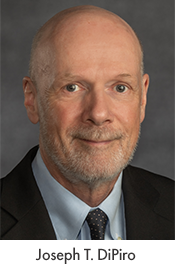
 Joseph T. DiPiro, dean of the Virginia Commonwealth University (VCU) School of Pharmacy in Richmond, has been named associate vice president for health sciences, faculty affairs.
Joseph T. DiPiro, dean of the Virginia Commonwealth University (VCU) School of Pharmacy in Richmond, has been named associate vice president for health sciences, faculty affairs.
The appointment was effective Aug. 1, and DiPiro continues to serve as dean of the pharmacy school. He said he looks forward to the opportunity to improve his colleagues’ work environment through professional development and other support.
“It’s a natural extension of what I’m doing as dean and something I know that I will enjoy and hopefully have some positive influence,” DiPiro said.
The faculty affairs position was previously filled by David C. Sarrett, former dean of VCU’s School of Dentistry. The position’s responsibilities include review and oversight of faculty promotion and tenure review in VCU’s five health sciences schools; review of recommendations for endowed chairs and professorships and emeriti and distinguished faculty appointments; and promotion of recruitment and retention processes to meet goals for diversity, equity, and inclusion.
DiPiro received a bachelor’s degree in pharmacy from the University of Connecticut and a Pharm.D. degree from the University of Kentucky. He has served as dean of VCU’s pharmacy school since 2014. His previous positions include executive dean at South Carolina College of Pharmacy and department head and assistant dean at the University of Georgia and Medical College of Georgia. DiPiro is the author of Pharmacotherapy: A Pathophysiologic Approach as well as editor of the ASHP–ASHP Foundation Pharmacy Forecast report and a member of the AJHP Editorial Board.
DiPiro said his challenges in the faculty affairs position include sustaining the good work of his predecessor while expanding efforts to broaden faculty development opportunities.
“We have a lot of support for faculty development that comes from different sources at the university. I’d like to be able to help to coalesce those resources and bring that to the attention of faculty. I think there’s a lot to be done in terms of faculty coaching,” DiPiro said.
He’s also eager to expand the onboarding procedures for new faculty, welcoming early-career professionals, and helping them become established.
DiPiro noted that the pharmacy school’s onboarding plan covers traditional topics such as how to navigate leave and travel policies. But he said new hires also learn about institutional culture and meet with “key people around the school and the university” who help with networking and mentorship processes. He’d like all incoming health sciences faculty to have similar opportunities.
One of his first acts has been conducting a listening tour to learn about his colleagues’ concerns and find ways to meet them.
“I’ve begun working with the other health science schools and their faculty affairs people and learned what their issues are, what they need,” DiPiro said. “The real work comes in February, when all the promotion tenure actions come through.”
He said VCU, like other organizations, is navigating transitional challenges brought about by the COVID-19 pandemic. And he noted that staff retention is an issue, as exhausted faculty consider quitting, retiring, or relocating.
“I don’t think we’re any better or worse than any other employment sector. But it’s just something that people have had to contend with. And I think we’ve got to find a better way to support faculty and staff members” DiPiro said. The pandemic has increased the dialogue around flexible working arrangements that meet the needs of faculty and staff.
He also noted that the pandemic has resulted in calls in the academic community to extend “tenure clocks” for faculty.
“A lot of universities have been doing that, as we have here,” DiPiro said.
[This news story will appear in an upcoming issue of AJHP.]







